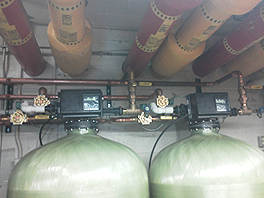I have some hints and tips for you to save money and even to avoid having to hire me! Further below you will find links to help you perform some basic plumbing repairs in your home.
I hope this information helps you.
Plumbing Hints and Tips
Turn off those taps
A dripping tap is more than just an annoying sound, it can waste up to 15 gallons of water every day, and add $100.00 to your yearly water bill. Make sure you turn your taps all the way off. If your taps continue to leak, please see the Plumbing Repairs section below.
Go for Low-flow
A 10-minute shower with a conventional showerhead can use up to 42 gallons of water. Low-flow showerheads can cut this usage in half! And the technology has improved so that you’re no longer standing in a cold mist barely getting wet... they’re much better these days.
Uncover hidden leaks
Not all water leaks are obvious. Some are hidden inside walls or under floors and require some detective work. Here’s one way to check whether you have any leaks in your home... check your water meter at the beginning of a time when you are certain no water will be used in your home. Note the number in the display. Then, a few hours later, check it again. If the meter has changed, then you have a water leak somewhere.
Don’t neglect your drains
Who thinks about their drains? No one... until they become clogged or are no longer working properly. To keep your drains in good shape, once a month pour a cup of baking soda followed by a cup of vinegar down them. Let this sit for several minutes, then pour boiling water down the drain (carefully!). In the bathroom, use strainers in the sink and bathtub to keep hair and sopa out of your pipes. Avoid using harsh chemical drain cleaners as they can damage your pipes, and they’re harmful to the environment.
Listen to your toilet
Your toilet may have something to tell you! A gurgling noise might point to a problem with your home’s main drain. Main drains installed before 1980 are likely to be made of clay and easily penetrated by tree roots. This can result in very expensive repairs if not addressed early. Calling in a plumber as soon as you hear a gurgling sound, or see wet marks around floor drains, will save you a lot of money in the long run.
Check for toilet leaks
In most homes, the toilet is the biggest water waster, with toilet flushing accounting for 30% of the daily water usage in the home. To test your toilet for leaks, drop some food coloring into the tank. If the color seeps into the toilet bowl within 10 to 15 minutes, your toilet has a leak and is wasting water. See the links below to repair a running toilet.
Be kind to your garbage disposal
While your garbage disposal might seem like an indestructible machine, there are certain items that can wear them out. Poultry skins, celery, fruit pits, and banana skins are not good for your garbage disposal because they can lead to blockages and offensive odors. Also, bones should never be put in the garbage disposal.
Never put fats and grease down your drains
Thanksgiving is the biggest day of the year for plumbing emergency calls, and the reason is that people pour the large volume of hot fat from the turkey down the sink or toilet. When that stuff cools and solidifies, it sticks to the inside of your pipes and causes a blockage. Don’t dump grease or fat into your plumbing system. Let it cool and solidify, then throw it in the trash.
Throw dental floss in the trash
Many people are in the habit of flushing their used dental floss down the toilet. Today’s dental floss is shred-resistant and won’t break down. When dental floss enters your sewage system, it bonds with other waste and forms large clumps that block pipes.
Don’t flush hair down the toilet
For many, it’s common practice to flush hair from hairbrushes or from the shower floor down the toilet. If you don’t want a backed up toilet, don’t flush hair.
How to clean your showerhead
To clean mineral deposits from your showerhead, remove it and soak it in vinegar overnight, then scrub gently with a toothbrush to remove deposits.
Check your washing machine hoses
Burst washing machine hoses are the number one cause of flooding in homes. Check them often for bulges and ruptures. Better yet, replace them with stainless steel hoses, which are much more durable than rubber hoses. Turn off the water supply to your washer when away on vacation.
Plumbing Repairs
Some plumbing repairs are straightforward and can be accomplished by anyone who is just a little bit handy, and has some basic tools. I searched the internet and found the best answers to the most common questions we get. (I also found a LOT of really bad advice on the internet!)
I hope that these articles and videos are helpful to you.
How to fix a dripping or leaky faucet
http://www.thisoldhouse.com/toh/article/0,,193895,00.html
or
http://www.howcast.com/videos/112867-How-to-Fix-a-Leaky-Faucet
How to unclog your toilet:
How to unclog your sink:
http://www.youtube.com/watch?v=ZMFBP6dX5fY
or
http://www.ehow.com/how_4504_unclog-sink-naturally.html
A great tool: www.thedrainclaw.com
How to prevent pipes from freezing:
http://www.youtube.com/watch?v=Mmchs0NppQo
or
http://www.thehomefixers.com/plumbers/frozenpipes/prevent-frozen-pipes.php
How to thaw frozen pipes:
How to drain your water heater
How to repair a running toilet:
http://www.diynetwork.com/how-to/how-to-fix-a-leaking-toilet/index.html
or
http://www.youtube.com/watch?v=2FOWj-J0wLU
How to repair a toilet that’s leaking at the base:
How to bleed a radiator:


